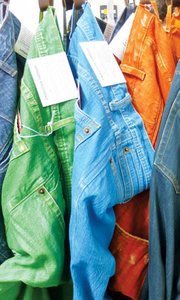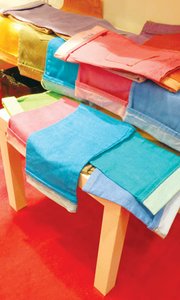New Textile Offerings Demonstrate a Cleaner Dye Process
Typical fabric dyeing is a messy process, involving large water use and harsh chemical waste water, which must be treated before disposal.
At the recent Texworld USA and Kingpins trade shows, several yarn and fabric makers introduced new products that promise to eliminate many of the drawbacks of the dyeing process.
Some were based on the cationic process, a chemical process that increases the affinity between the fiber and the dye. Treated fibers absorb nearly all of the dyestuff, producing waste water that is nearly clear and can be reused for the next dye bath.
At Texworld USA in New York, Mt. Pleasant, N.C.–based spinning mill Tuscarora Yarns was showing fabrics made from its ProTura yarn, made from cationic reactive cotton, according to Andy Long, Tuscarora’s vice president of sales. Mixing the ProTura yarn with traditional yarns can yield new knit patterns dyed using less water and chemicals.
The company recently teamed up with international color-solutions provider DyStar to offer a water-saving fiber and dye process for colored denim using Protura cotton and DyStar’s pre-reduced indigo and its Lava Chemicals & Dye.
At Kingpins’ New York show, Greensboro, N.C.–based Burlington Solutions/Cone Denim introduced Affinity, a new denim dye process made with fabrics featuring treated yarns, said Garry Kernighan, executive vice president of Cone. Treated yarns mimic the look of a ringdye yarn. As a result, Affinity fabrics can be sanded and scraped like a traditional indigo- or sulfurdyed denim. Made in a closed-loop system without adding soda ash or salt, Affinity has an “outstanding” washfastness, Kernighan said, adding that the fabric has a wet crock of 3.5 and a dry crock of 4.5. Traditional indigo denim can crock—meaning the color rubs off easily when wet or dry—because of the challenge of affixing the dye to the cotton.
The Affinity dyecycle is also shorter—garments can be processed in 90 minutes, compared with the typical 245 minutes, reducing the amount of energy used in dyeing. In addition to denim, Cone also offers Affinity knits.
The Affinity process is available for finished goods with minimum orders beginning at 1,000 pieces per style. The minimum dyelot for color is 100 pieces. Fabric can be ordered in 10,000-yard minimums. Cone denim is made in the United States, Mexico, Nicaragua and China. Finished garments are produced through Burlington’s ITG Phong Phu Supply Chain City vertical facility in Danang, Vietnam.
Another company offering an alternative to traditional dyeing is New York–based ColorZen, which will pre-treat cotton fibers with a chemical process similar to cationic treatment—“but a whole lot more than that,” said Michael Harari, president of the 2-year-old company. Fabrics made from ColorZen-treated fibers also come out of the dyebath with clear effluent, which can be reused in the next dyebath. Treated fabrics use 90 percent less water, 70 percent less energy and 95 percent fewer chemicals, Harari said. And like Cone Affinity fabrics, the dye process is shorter, reducing energy costs and increasing capacity.
The company has also created a hangtag program to get the word out to the end consumer about Affinity’s environmental benefits.
“Our vision is for every garment producer to use the hangtag to notify consumers that it’s been sustainably dyed,” he said. “It’s about educating the consumer and offering them a choice.”
Both Cone’s Kernighan and ColorZen’s Harari acknowledged that their products cost more than traditional untreated cotton, but the added costs are offset by the water and energy savings.
“There are significant dollar savings with water, chemicals, energy and dyes,” Harari said.
“With our process, you use 50 percent less dyes, and [the shorter cycle time means] the dyehouses can increase production. All of these savings are tangible and offset most of the costs associated with the technology. It’s almost like a shock to the industry.”
Another company offering a water-saving alternative at the Kingpins New York and Los Angeles shows was BluConnection, based in Singapore, which sells DenimBlu30, a hydrogenated, or pre-reduced pure indigo dye. DenimBlu30 is “shipped with no oxygen, offers improved fixation, less chemicals,” said Paul Cowell, branding and innovation manager for BluConnection. “Prereduced indigo provides consistent level of shades, so you save 5 percent, 10 percent, 15 percent off off-shade waste.” BluConnection also produces DenimBluFX, a dye that gives denim the look of a tinted indigo but without fully penetrating the yarn to the core. Yarns dyed with Denim- BluFX maintain their bright core, which help create high-contrast effects on finished garments, Cowell said.
Traditional indigo dyeing involves multiple washes in the dyebath to get darker shades.
“It’s a crazy industry,” Cowell said. “We put indigo on fabric, and then we wash it off.”
BluConnection’s dyes create the same look with less water and fewer chemicals.
For more information about any of these products, visit www.tuscarorayarns.com, www.bluconnection.com, www.colorzen.com and www.conedenim.com.























